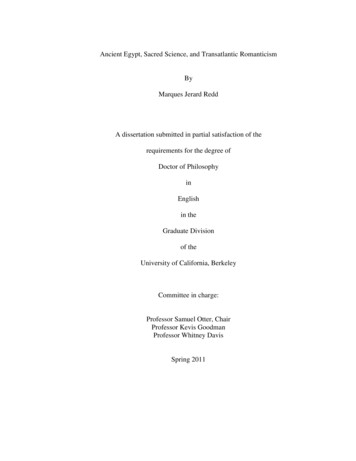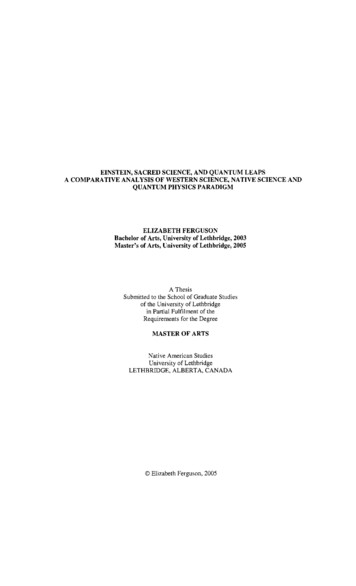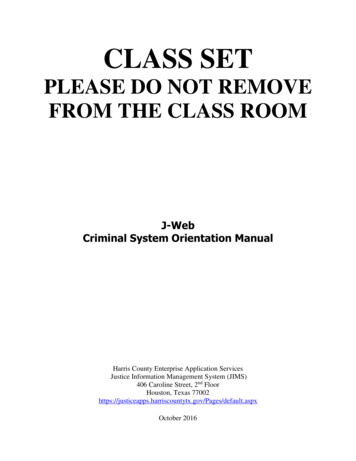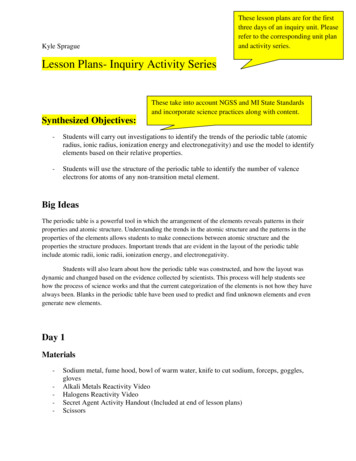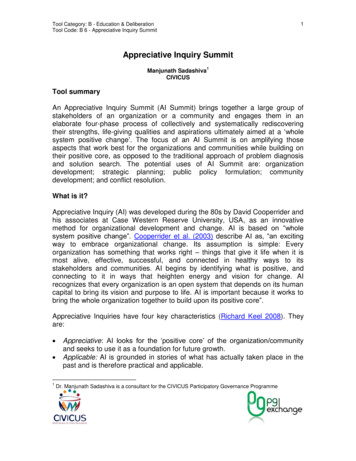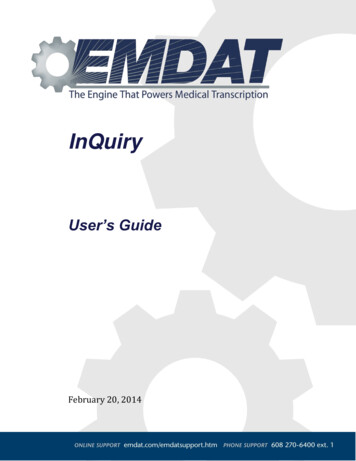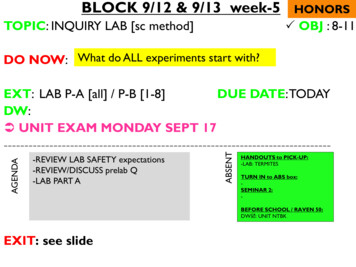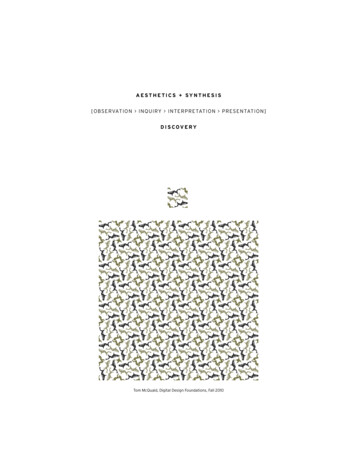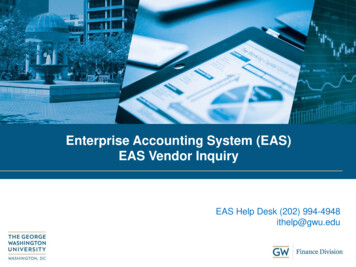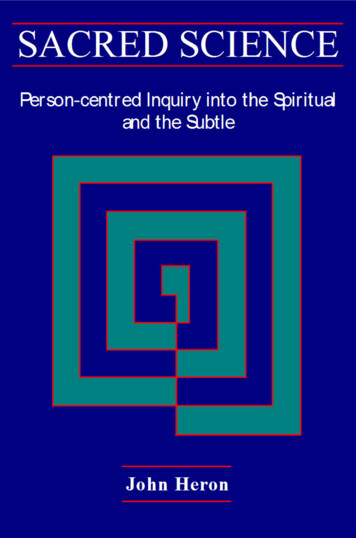
Transcription
Sacred SciencePerson-centred Inquiry into the Spiritual and theSubtleJohn HeronEndymion PressAuckland
First published as a paperback in 1998 by PCCS Books, Llangarron, Ross-onWye, Herefordshire, HR9 6PT, UK.Sacred Science: Person-centred Inquiry into the Spiritual and the SubtleISBN 1 898059 21 7British Library Cataloguing in Publication dataA catalogue record for this book is available from the British LibraryLibrary of Congress catalog record availableFirst published as an e-book at www.human-inquiry.com in 2008 by EndymionPress, South Pacific Centre for Human Inquiry, 11 Bald Hill Road, R.D.1 Kaukapakapa, Auckland 0871, New Zealand.This e-book is a reprint of the text of the 1998 edition by arrangement with PCCSBooks.Page size: 15.6 cm by 23.4 cm. Font: Times New Roman 10 pt.Other paperback books by John Heron:Participatory Spirituality, Lulu Press, 2006Cosmic Psychology, eighth edition, Endymion Press, 2006Living in Two Worlds, third edition, Endymion Press, 2006Helping the Client, fifth edition, Sage Publications, 2001The Complete Facilitator's Handbook, Kogan Page, 1999Co-operative Inquiry, Sage Publications, 1996Feeling and Personhood, Sage Publications, 1992
ContentsPreface xPart 1: Perspectives of lived inquiry1 Introduction and background 1A pioneer approach 1A self-generating spiritual culture 2Gender-laden perennialism 3Religious feminism 4The nature of the self 6Sacred science 8A basic quaternary of terms 8The transpersonal, ego and person 9Personhood, autonomy and process theology 10Personal experience as inclusive 12Mediated-immediacy and inquiry 14Co-operative inquiry 16Lived inquiry 17Inquiry warrants 18A little bit of personal history 20A simple map 21Spiritual and subtle currents in contemporary culture 23Liberal theology 23Process philosophy and personalism 23Existentialism and phenomenology 24Poststructuralism 24The human potential movement 24Religious studies 25Hindu and Buddhist teachers 25Encounters with the after-life 26The spiritual and the subtle 28International Centre for Co-operative Inquiry 292 Spiritual inquiry and projected authority 31Spiritual studies 31Spiritual innovation and tradition 31The authoritarian blight 32Spiritual projection and authority 34Four stages of projection 35
ContentsThe distortions of spiritual projection 38Initiation old and new 40Lived inquiry, intermediate projection, a self-generating spiritual culture42Fallacy of the perennial philosophy 43Tradition and inquiry 46Indoctrination, training and inquiry 483 Spiritual inquiry and the authority within 50Internal spiritual authority 50Critical subjectivity 51Spiritual life within 52Other accounts of the spiritual life within 52Co-creating with immanent spirit 53Appropriate discourse with the other 54The relevance of co-operation 56Spiritual deconstruction 56Co-operative spiritual inquiry 58Solo and group precursors 59A balance of triads 60Dipolar and polymorphous theology 604 Issues in subtle inquiry 63The subtle 63Three phases 64Relevance of co-operative inquiry 65Presuppositions and guiding principles 66Initiation through imagined experience 67Shifts of mentation and declarative validity 67A canon of subtle inquiry 68Heron's beard and Occam's razor 68Applying the canon 69Refraction theory 70More about method 715 The challenge of cartography 73A launching map 73The lure of the east 74Washburn and Grof 74Maps from monopolar patriarchs 76iv
ContentsEvolution reduced to reflux 80Emergent evolution as intrinsic to creation 82Inflation of the nondual 836 A dipolar map of the spiritual and the subtle 86Provisional criteria for a new map 86Complementarity, dipolarity and integration 86Cartography as warranted belief 87A dipolar map of the spiritual and the subtle 88The spiral and figure of eight 947 Methods for the second form of spiritual transformation 101Spiritual transformation 101Method, route and knack 101Tacit-to-explicit knacks 102Consciousness, life and trained attention 105Method, metaphysic and acting out 107What happened to Buddhism? 108Meditation, letting go and the dark return 108Non-attachment and relationships 110Doctrinal roots of authoritarianism 111Reticence about reincarnation 111Not enough ‘good life’ 111Authoritarianism run amok 113A perinatal template for doctrine? 113The resolution of differences 114Part 2: Co-operative inquiry reports8 Procedures 116Initiating an inquiry 116A journey of opening 117Personal meaning 118Indoctrination or opening 119Access, impact, first and second order stabilization 121An outline of inquiry stages 122Apollonian or Dionysian 123Transformative and informative inquiries 1259 Reports, adequacy and viability 126v
ContentsPrimary and secondary outcomes 126The status and purpose of reports 126Studies and stories 127Apollonian and Dionysian 127Adequacy and viability 128The inquiries: viability and adequacy 129The reports 130Issues about record-keeping 13010 Spatiotemporal extensions 132Membership and time structure 132Initial hypothesis 132Cycle 1: there(near)-now ASC 133Cycle 2: there(near)-now ASC 134Cycle 3: here-now and there(near)-now ASC 135Cycle 4: there(far)-now ASC leading into here-now and there(far)-nowASC 136Cycle 5: there(near)-now leading by stages to there(far)-now adding herenow ASC 137Cycle 6: there(near or far)-now ASC 138Cycle 7: there-then(past) ASC 138Cycle 8: here(space-1)- there(space-2)-now ASC 139Cycle 9: here(space-1)-there(space-2)-now ASC 140Review and forward planning 140Evaluation 140Findings of the inquiry 14211 Impressions of the other reality 145Membership and time structure 145Initial hypothesis and overall design 145Cycle 1: A ritual for receiving impressions of the other reality 146Cycle 2: A ritual for receiving impressions of the other reality 147Cycle 3: Noticing the other reality at the edge of the visual field 148Cycle 4: Procession and entry to the other reality in the fogou 148Cycle 5: A sword in the other reality 150Cycle 6: Closing ritual at a stone circle 151Evaluation 152Findings of the inquiry 155vi
Contents12 The bliss nature and transtemporal regression 15713 Knacks in entering altered states 161Overview 161A classification of the knacks 163Physical sensation knacks 163Intuitive knacks 163Surrender knacks 164Mediumistic knacks 164Intellectual knacks 164Psychodynamic knacks 165Devil’s advocate procedure 165Issues for further inquiries into knacks 165Evaluation 166The relevance of biculturalism 16714 Charismatic expression 16815 Transpersonal activities in everyday life 173Overview 173First reflection meeting 174Second reflection meeting 175Third reflection meeting 176Fourth reflection meeting 177Fifth reflection meeting 179Sixth reflection meeting 180Seventh reflection meeting 181Inquiry outcomes 182Nuggets on personal transformation 183Practical knowledge outcomes 184Knowing how to commune with trees 184Knowing how to open to a greater spiritual reality 185An individual report 186Evaluation 18716 Transpersonal inquiry within a self-generating culture 189Overview 189Self-generating culture findings 190History of the transpersonal inquiry 190Findings of the inquiry subgroups 193vii
ContentsEntering into clairvoyance from attention to closed eye idio-retinal images193Entering altered states by sustained mutual gazing 194Entering altered states by sustained mutual gazing, combined with holisticpulsing 194Exploring out-of-the-body experience 194Tapping in to subtle energy of various kinds - exploring subtle energytelekinesis 194Entering transtemporal regressive states 194Evaluation 19517 Ritual and interpersonal process 196The invitation 196Inquiry strands 196Recorded outcomes 199Evaluation 20018 Empowerment in everyday life and group life 202Overview 202Findings 204Dipolar holonomy 205Evaluation 20619 Co-creating 207Overview 207Evaluation 209Theory and method of co-creating 210Preface 210Theory 210General application 213Application within co-creating sessions 215Teaching points 22220 Coming into being 225The evolution of the wavy group 225Evaluation 228Epilogue to Part 2 230Just a start 230Theological stripping 230Advantages and disadvantages 231viii
ContentsPart 3: A participatory worldview21 Participatory research 234One page description of co-operative inquiry 234Co-operative inquiry and its inquiry paradigm 235Reality as subjective-objective 236An extended and holistic epistemology 238A collaborative methodology 240Practical flourishing an end in itself 241A self-generating culture 24322 Participatory theology and cosmology 245God and what there is 245Participatory theology 246The theology of embodiment 247Feeling the presence of the world 247The concept of presence 248Presence-as-such 249Imaging being in a world 250Consciousness-as-such 251Immediate present experience and the theology of action 252Inquiry into Being 253Participatory cosmology: a conjecture 254References 255Index 261ix
PrefaceI am most grateful to all the co-inquirers - from Australia, Germany, Holland,New Zealand, UK, USA - who have participated in the several co-operative inquires reported in this book, for their creative colleagueship and redoubtable integrity in researching the spiritual and the subtle. I also appreciate the notes,comments and reports which many of them have made available to me, and whichI have included as citations in the text, or as corrections, amendments and additions to my writing.Over sixty percent of my co-inquirers have been women, and under forty percent have been men. I am appreciative of the influence this ratio has had on mybeliefs about a fully human, bigendered spirituality. In this regard, I have learntfrom so many, including Anne Bailey, Louise Breuer, Julian Briggs, Jill Calveley,Nicola Campbell, David Colbourne, Graham Colbourne, Mary Corr, Liadon Cotter, Kim Gosden, Jennie Harris, Richard Horrocks, Dale Hunter, Katy Jennison,Quentin Jones, Don Joyce, Peta Joyce, Barbara Langton, Evelyn Marsden, RexMcCann, Glenn McNicoll, Pam Michell, James Nichol, David Petherbridge,Jenny Pinder, Kate Reed, Val Regan, Niek Sickenga, Roberta Skye, Joke Stassen,Nick Thompson and Annie Wheeler. Barbara Langton read a late draft of thebook and I am grateful for her wisdom in raising my consciousness about severalkey points, which has led to important revisions in the text of Part 1.Outside the field of co-operative inquiry, I owe a special debt of gratitude toJorge Ferrer for providing me with a large number of relevant references, thestudy of which has enabled me to portray my ideas on a wider canvas than wouldotherwise have been the case; also for a detailed critical commentary, on an earlydraft of Part 1 of the book, which alerted me to several issues needing more thoroughgoing attention. He is, of course, in no way responsible for the ideas which Ihave expressed as a result of his critique.I also wish to give my warm thanks to Maggie Taylor-Sanders of PCCS Booksfor her strong, supportive response to the original proposal, and for her cooperative and flexible approach to working with me throughout the publishingprocess.The book is in three parts. Part 1 is about the beliefs and perspectives based onmy own lived inquiry into the spiritual and the subtle, and which have led me tothe practice of co-operative inquiry in this same field. Part 2 presents eleven reports of co-operative inquiries which I have initiated, most of them in recentyears. Part 3 is about participatory research and participatory theology.Part 1 includes a discussion of basic matters to do with spiritual inquiry. A certain proportion of this consists of a critique of other commentators, principallyKen Wilber, whose current standing in the field of transpersonal studies I can onlyhonour by making clear the many respects in which I find his views unsound. The
Prefaceissues thrown into relief by this sort of disagreement I regard as a fruitful outcomeof dialogue between radically differing perspectives.The guiding ideas behind my belief in and practice of co-operative inquiry inthe spiritual and subtle field are that the human person: Is a distinct spiritual presence in, and nonseparable from, the given cosmos;and as such is not to be reduced to, or confused with, an illusory, separate,contracted and egoic self with which personhood can become temporarilyidentified. Emerges from and is grounded in immanent spiritual life; and is informed andilluminated by a transcendent spiritual consciousness. Participates, through immediate experience - the very process of being in aworld - in divine presence. Has her or his own original relation to and revelation from divine creation. Has spiritual authority within as inner life and inner light. Has freedom to co-create, with immanent spiritual life, an innovative spiritualpath. Manifests the creative process of divine becoming as an autonomous spiritualbeing, embedded in connectedness, and engaged in co-operative, transformative relations with other persons similarly committed.In an earlier book, Feeling and Personhood (Heron, 1992), I suggested that thereare various states of personhood, which I called primal, spontaneous, compulsive,conventional, creative, self-creating, self-transfiguring and charismatic; andlooked at various possible relations between them, and possible patterns of personal development in which they figure. The self-transfiguring person I portrayedas one who: has embarked upon the realization of their subtle energies, psychic capacities and spiritual potentials. They are busy with transformations of ordinary perception and action, extra sensory development and access to other realities, ritual, meditation, prayer, worship, and living in the now.And all this is integrated with a creative, expressive life in the world. (Heron, 1992: 61)The present book is about some of the options available to the self-transfiguringperson: participating in a self-generating spiritual culture, adopting a path of livedinquiry, and joining in occasional co-operative inquiries into the
Sacred science 8 A basic quaternary of terms 8 The transpersonal, ego and person 9 Personhood, autonomy and process theology 10 Personal experience as inclusive 12 Mediated-immediacy and inquiry 14 Co-operative inquiry 16 Lived inquiry 17 Inquiry warrants 18 A little bit of personal history 20 A simple map 21 Spiritual and subtle currents in contemporary culture 23 Liberal theology 23 Process .
